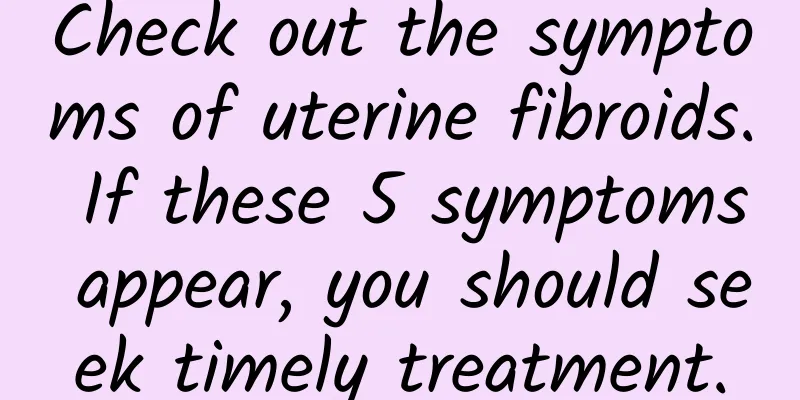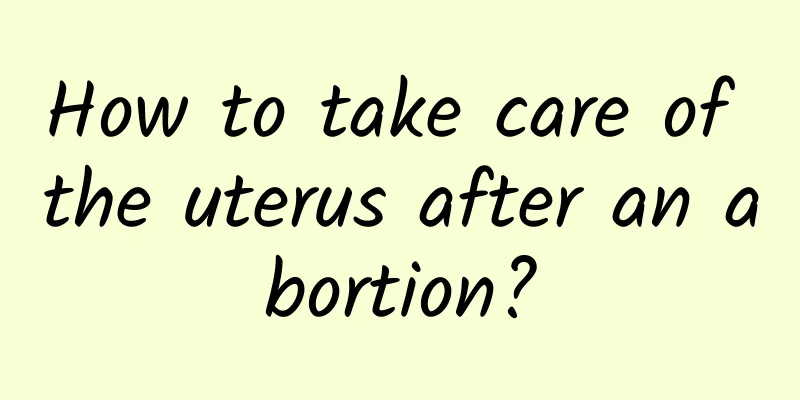What are the sequelae of abortion? What are the symptoms of diseases left after abortion?

|
Abortion is a common method for women to terminate pregnancy, but many people have certain concerns about their physical condition after abortion. In fact, although there are some sequelae after abortion, most of them can be alleviated and avoided through proper care and the guidance of doctors. Next, we will introduce in detail the possible sequelae after abortion and their manifestations. Concerns about post-abortion Although abortion is a common surgery, it still worries many women. Especially for those who do not fully understand it, they are very afraid of the possible sequelae and root causes of the disease after abortion. Therefore, it is important to understand the possible symptoms after abortion and correctly understand these symptoms. Symptoms that are difficult to detect with the naked eye For many women, their physical condition after abortion does not seem to be obviously abnormal in the early stage after the operation. This is because many symptoms after abortion are asymptomatic and can only be discovered after careful observation and examination. For example, possible pathological tissue residues, uterine adhesions and other problems may lead to greater health risks if they are not taken seriously. Irregular periods and dysmenorrhea After an abortion, a woman's physiological cycle may be affected to a certain extent, and it is common for the menstrual cycle to become irregular. Some women may experience a decrease in menstrual flow or a prolonged menstrual cycle, while others may experience an increase in menstrual flow or a shortened menstrual cycle. In addition, some women may also experience dysmenorrhea after an abortion. Although most symptoms will recover on their own within a few months, women with persistent symptoms should seek medical attention in a timely manner. Regulation of the endocrine system Abortion can have a significant impact on a woman's endocrine system, thus affecting the body's balance and regulation. This is because after an abortion, hormone levels change, which may lead to a series of physiological and psychological reactions. For some women, they may experience mood swings, irritability, depression and other symptoms after an abortion. These symptoms are usually short-lived, but for women who have long-lasting symptoms, they may need to seek psychological counseling or help from a professional doctor. Reproductive system infections and complications After an abortion, if you do not recover well or do not perform proper postoperative care, it is possible to cause reproductive system infection or complications. These complications include endometritis, pelvic inflammatory disease, fallopian tube blockage, etc., which will pose a certain threat to women's health. After an abortion, women should try to avoid sexual intercourse, do not insert intrauterine contraceptive devices, etc., and perform relevant postoperative care according to the doctor's instructions, which can effectively reduce the occurrence of complications. Summarize The root causes and sequelae of abortion mainly include irregular menstruation and dysmenorrhea, regulation of the endocrine system, infection and complications of the reproductive system. Although these symptoms are temporary for most women, it is still recommended that women seek medical help and guidance as soon as possible and pay attention to postoperative care and rehabilitation to reduce the impact on the body. In addition, before deciding to have an abortion, women should also fully understand the risks and possible sequelae of the operation and make a wise decision. |
<<: How to check whether dysmenorrhea is primary or secondary How to check the cause of dysmenorrhea
Recommend
What are the causes of irregular menstruation in women? There are two reasons for irregular menstruation in women.
Many women's problems There are two main reas...
Who is prone to Bartholin's gland cyst symptoms and causes
Women of childbearing age, especially those with ...
Can chocolate cysts be treated with strenuous exercise?
Patients with chocolate cysts should not engage i...
Rope throwing high-intensity exercise burns 900 calories
Burning 900 calories in 30 minutes is no longer j...
Can I drink saffron water if I have uterine fibroids?
Usually, patients with uterine fibroids can drink...
A brief discussion on dietary taboos for patients with bacterial vaginitis
With the increasing incidence of bacterial vagini...
What are the symptoms of endometriosis?
Endometriosis is a common gynecological disease w...
What are the symptoms of threatened miscarriage in pregnancy?
What are the symptoms of threatened abortion when...
Eat sweets when it’s cold? 1 slice of cheesecake = 300 calories
There are many year-end gatherings, and you can’t...
Many people are curious about what the gestational sac looks like after medical abortion.
When the gestational sac is discharged, we can se...
Is irregular menstruation hereditary?
Is irregular menstruation hereditary? Irregular m...
Pay attention to the prevention of vulvar leukoplakia to live a healthy life
Suffering from vulvar leukoplakia does bring a lo...
What are the possible symptoms of adenomyosis?
Some people don’t know much about adenomyosis. Th...
Treatment of irregular menstruation due to liver and kidney deficiency
Liu Xia is just 26 years old this year, but she h...
The two most common methods of diagnosing uterine fibroids
The uterus is a place where tumors are more likel...









